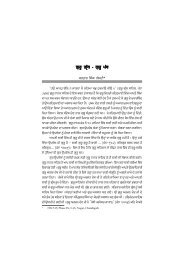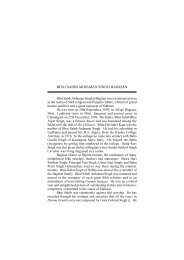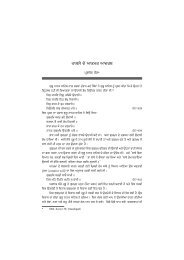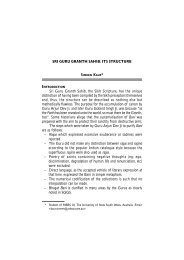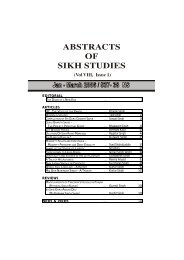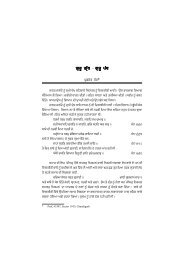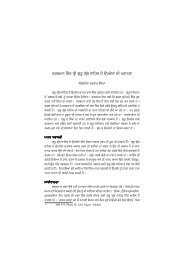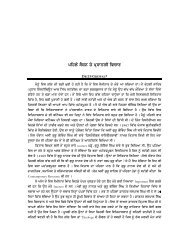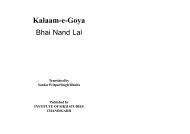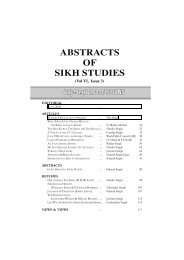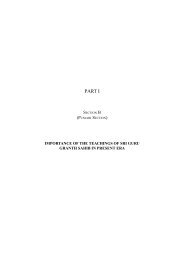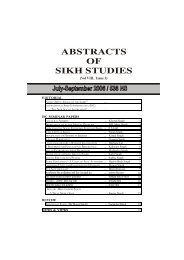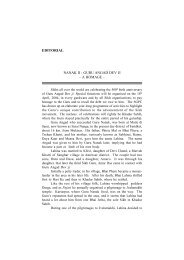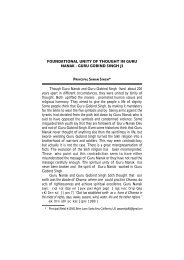editorial articles reviews news & views - Institute of Sikh Studies
editorial articles reviews news & views - Institute of Sikh Studies
editorial articles reviews news & views - Institute of Sikh Studies
You also want an ePaper? Increase the reach of your titles
YUMPU automatically turns print PDFs into web optimized ePapers that Google loves.
108<br />
ABSTRACTS OF SIKH STUDIES : APRIL-JUNE 2005 / 537 NS<br />
SRI GURU PANTH PARKASH<br />
A REVIEW BY HARDEV SINGH *<br />
Author : Rattan Singh Bhangu<br />
Publisher : Singh Brothers, Bazar Mai Sewan, Amritsar, 2004<br />
Pages : 448; Price : Rs 275/-<br />
Rattan Singh Bhangu, the author <strong>of</strong> Panth Parkash, was the<br />
grandson <strong>of</strong> famous <strong>Sikh</strong> warrior, Sardar Mehtab Singh Mirankotia,<br />
who killed Massa Ranghar in the holy precincts <strong>of</strong> Golden Temple, to<br />
liberate it from the sacrilege created by the marauder. This is considered<br />
to be an authentic source <strong>of</strong> <strong>Sikh</strong> history after the Guru period<br />
pertaining to the most crucial phase <strong>of</strong> the <strong>Sikh</strong> struggle during the<br />
eighteenth century. The author was persuaded by Captain Murray <strong>of</strong><br />
the British army to compile the history <strong>of</strong> <strong>Sikh</strong> struggle leading to<br />
establishment <strong>of</strong> Khalsa Raj. The author started the work on this<br />
project in 1809 and completed it in 1841. It is based on inter<strong>views</strong>,<br />
family history and the information collected by the British and French<br />
<strong>of</strong>ficers about Punjab. Panth Parkash is basically an oral history text <strong>of</strong><br />
the <strong>Sikh</strong> struggle during the 18 th Century.<br />
Rattan Singh Bhangu had no training in historiography, and there<br />
were no written accounts available regarding <strong>Sikh</strong> History. So he faced<br />
a formidable task to complete his project. The text was written in old<br />
Punjabi verse. Bhai Veer Singh, the great <strong>Sikh</strong> savant, got it printed in<br />
Vazier Hind Press, Amritsar in 1914. Balwant Singh Dhillon, the Editor<br />
<strong>of</strong> the present volume has done an excellent job by comparing the old<br />
hand-written manuscript <strong>of</strong> Panth Parkash with printed edition <strong>of</strong> Bhai<br />
Veer Singh. The edited version contains footnotes to explain the<br />
discrepancies <strong>of</strong> the old printed editions and the textual material. Singh<br />
* Dr, # 360, Sector 71, SAS Nagar, Mohali



